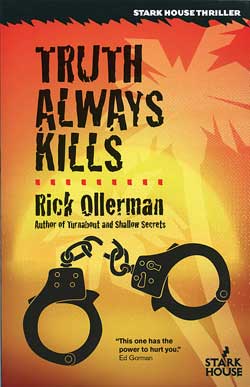
“Process is an interesting topic because it changes and evolves as your experience as a writer grows and evolves. Often I like to start with “what if ” questions when I start to think of a plot. When I began Truth Always Kills, it was something like, ‘The FBI tells us that stalking is the closest thing we have to a reliable predictor of murder. What if you know that, and what if your significant other is being stalked by someone in exactly those ways that often don’t end up well? What would you do? What can you do?’
“That led me to think of the kind of character that would have this kind of knowledge, and then made me think of what kind of person he’d have to be, to be capable of following through on any of the alternatives. And when you think about the most extreme of these, how would anybody make that happen without becoming a suspect themselves? Other people would be aware that the stalker has a victim, so if he just up and disappears, clearly the stalking victim and the people around her would warrant a look by the authorities, wouldn’t they?
“Then I took it further. I presented the character with choice after choice, each one giving him the opportunity to do what’s right morally or what’s right by the letter of the law. Each time he does what he feels he has to do, yet each time someone ends up suffering. This is an immense burden, but it serves as the crux of the character with which I built the plot around. I don’t want to say any more because I don’t like spoilers, but it should give an idea of one way I come up with what I think of as a character-driven sort of plot.”
Excerpted from the interview with Rick Ollerman that appears in The Digest Enthusiast No. 7.


Comments are closed.